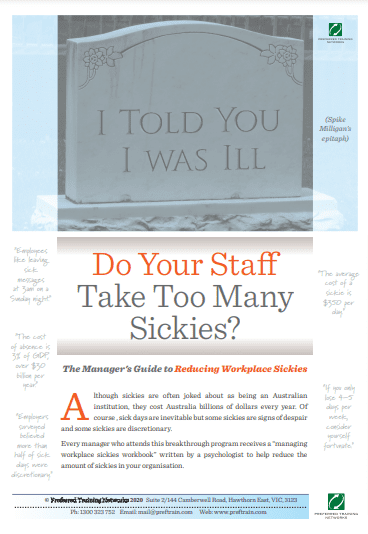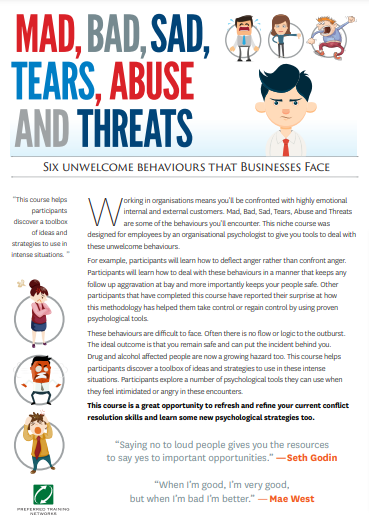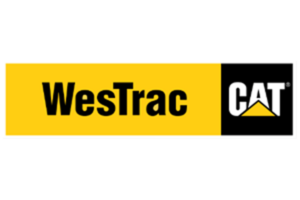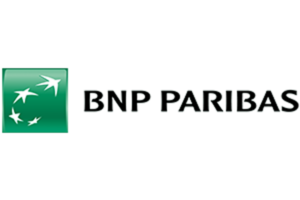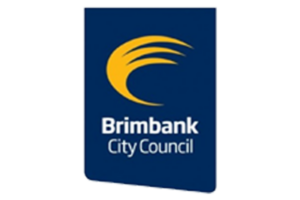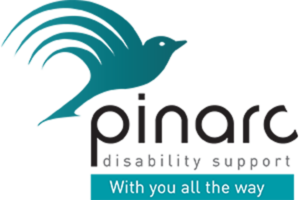Currently Empty: $0.00
Reducing Workplace “Sickies” Workshop
Reducing Workplace “Sickies” Training Courses are unique. Indeed, the phrase “workplace sickie” is quintessentially Australian.
In Australia, everyone gets 10 days of sick leave a year, for full-time employees. But that doesn’t mean that everyone has to take the entire sick leave. Imagine if the workplace wasn’t a chore and people really wanted to work. So the sickies are not perceived as a benefit of employment, but rather a lever to be used if someone is actually unwell.
In-house Reducing Sick Days Training Courses
And that’s the core of the workshop. Let’s help your organisation rethink workplace sickies. Of course, they can be used. But can we reduce the impetus to use them by changing the organisational makeup.
Get Instant Quote in just 5 Clicks!
Course Description
Although sickies are often joked about as being an Australian institution, they cost Australia billions of dollars every year. Of course, sick days are inevitable but some sickies are signs of despair and some sickies are discretionary.
Every manager who attends this breakthrough program receives a “managing workplace sickies workbook” written by a psychologist to help reduce the amount of sickies in your organisation.
Signposts of Sickies:Sick of selfFrom time to time, people feel low esteem. Self motivation ebbs and tasks become chores. When people are sick of themselves they often feel more isolated and find it difficult to get back on track.
- Identifying the signs of low esteem and low morale
- Learning terminology that should be avoided
- Peppering in some pick-me-up through the day
- Keeping communication lines open
- Rewarding and recognise tasks
You might notice that some of your people are not themselves. They just don’t seem to care about their colleagues. They become indifferent and often focus more on the process than the person.
- Identifying signs of disillusionment
- Thomas Killman Conflict Model
- Improving staff morale
- The power of positive communications
- Working with different personalities
- Building strong, dynamic teams
- Being aware that the team is only as strong as the least committed performer
This is the number #1 cause of discretionary sick days in the workplace. The employee is sick of the workplace. When that alarm goes off in the morning, they groan and look for options to take a sickie. These employees often have a hostage mentality and they are disengaged from your organisation.
- Identifying the signs of “sick of work”
- Employee engagement — who cares?
- The psychology of Adams' equity theory
- Role ambiguity #1 cause of workplace disillusionment
- Generation differences what can you do?
Throughout our working lives, we face constant hurdles and struggle points. Occasionally, employees reach crisis points and either bottle up the pressure or explode. Learn proven methods to regulate and release the levels of stress and anxiety in the workplace.
- Being aware of negative self talk
- Proven methods to relax and unwind
- Unravelling your thoughts and positive self talk
- Stress reduction techniques even on the busiest of days
- Being resilient at work – Does resilience really matter?
When you’re sick, you’re sick. That is why the sick days are there. Usually you don’t want sick people in the workplace, and you would much prefer them at home resting and recuperating. However, in this session participants learn ways to avoid and reduce the amount of bacterial based germs in the workplace. And you also learn some ideas on how to keep employees fit and healthy.
- The cost of sickness - ABS statistics
- Being proactive instead of reactive
- Reducing the length of recovery time
- The impact of showing empathy
4 Benefits of running this course
- When employees hear that sickies are on the radar, discretionary sickies decrease immediately.
- Some sick days are signs of despair that are completely missed by managers.
- Some workplace sickness is preventable.
- Learn to reduce recovery times and increase productivity
Group Size: An ideal group size is 4?–12 participants.
Venue: For your convenience, you can choose to conduct this program at your offices. Alternatively, we can provide a training venue at a small additional cost
Duration: This program is conducted as a one day course.
Cost: Upon request.
Target Audience: Senior management, middle management, team leaders and supervisors.

Australia-wide training courses and workshops
At Preferred Training Networks, we provide both in-person and online training programs for a wide range of organisations across Australia. Our Reducing Workplace “Sickies” Workshop is run by experienced, qualified experts and tailored to the needs of your business and your employees. Our leadership and management education courses are designed to help your team thrive and develop valuable skills that can transform your workplace.
With programs available in Sydney, Canberra, Melbourne, Perth, Adelaide, Brisbane and other areas of Australia, we’re able to help businesses across the country create lasting behavioural change and provide them with the tools they need to reach new heights. If you think your business would benefit from Reducing Workplace “Sickies” Workshop and the help of our professional coaching network, take the first step and contact our team today. Wherever you are in Australia, our coaching program can either come to your organisation or we organise a venue for your convenience. Find out what our training, workshops and skills courses can do for your business and reap the benefits for years to come.
Get your free online quote right now or give us a call on 1300 323 752 to find out more about Preferred Training Networks and discuss your requirements with us.


